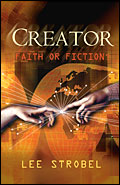Creator: Faith or Fiction?
Lee Strobel
[ English | Vietnamese ]

The Fusion of Science and Faith
There's a lot of misunderstanding about faith. Some believe faith actually contradicts facts. "The whole point of faith," scoffed Michael Shermer, editor of The Skeptical Inquirer, "is to believe regardless of the evidence, which is the very antithesis of science" (How We Believe, 123).
However, that's certainly not my understanding. I see faith as being a reasonable step in the same direction that the evidence is pointing. In other words, faith goes beyond merely acknowledging that the facts of science and history point toward God. It's responding to those facts by investing trust in God-a step that's fully warranted due to the supporting evidence.
Oxford's Alister McGrath pointed out that all worldviews require faith. "The truth claims of atheism simply cannot be proved," he said. "How do we know that there is no God? The simple fact of the matter is that atheism is a faith, which draws conclusions that go beyond the available evidence" (Glimpsing the Face of God, 22).
On the other hand, the available evidence from the latest scientific research is convincing more and more scientists that facts support faith as never before. "The age-old notion that there is more to existence than meets the eye suddenly looks like fresh thinking again," said journalist Gregg Easterbrook. "We are entering the greatest era of science-religion fusion since the Enlightenment last attempted to reconcile the two" ("The New Convergence," Wired (December 2002)).
"Intellectual Cousins"
For John Polkinghorne, who achieved acclaim as a mathematical physicist at Cambridge before becoming a full-time minister, the same kind of thinking he uses in science has helped him draw life-changing conclusions about God:
No one has ever seen a quark, and we believe that no one ever will. They are so tightly bound to each other inside the protons and neutrons that nothing can make them break out on their own. Why, then, do I believe in these invisible quarks? . . . In summary, it's because quarks make sense of a lot of direct physical evidence. . . . I wish to engage in a similar strategy with regard to the unseen reality of God. His existence makes sense of many aspects of our knowledge and experience: the order and fruitfulness of the physical world; the multilayered character of reality; the almost universal human experiences of worship and hope; the phenomenon of Jesus Christ (including his resurrection). I think that very similar thought processes are involved in both cases. I do not believe that I shift in some strange intellectual way when I move from science to religion. . . . In their search for truth, science and faith are intellectual cousins under the skin (John Polkinghorne, Quarks, Chaos, and Christianity, 98-100).
Polkinghorne added, however, an important distinction. "Religious knowledge is more demanding than scientific knowledge," he said. "While it requires scrupulous attention to matters of truth, it also calls for the response of commitment to the truth discovered" (Ibid., 13).
"The Nature of Truth
According to McGrath, the Hebrew word for "truth" suggests "something which can be relied upon." Thus, he said, truth is more than about simply being right. "It is about trustworthiness," he explained. "It is a relational concept, pointing us to someone who is totally worthy of our trust. We are not being asked to know yet another fact but to enter into a relationship with the one who is able to sustain and comfort us" (Alister McGrath, Glimpsing the Face of God, 44).
The facts of science and history, then, can only take us so far. At some point, the truth demands a response. When we decide not merely to ponder the abstract concept of a designer but to embrace him as our own-to make him our "true God"-then we can meet him personally, relate to him daily, and spend eternity with him as he promises.
Taken with permission from The Case for a Creator, printed by Zondervan. Copyright © 2004 by Lee Strobel. www.zondervan.com
Have you ever wondered if God exists?
Maybe you think belief in God is only for the weak-minded, those who are ignorant enough to let blind faith keep them from acknowledging the hard facts of science. But science and faith don't have to be at odds. As you have just read, many scientists are discovering that the facts of nature suggest an intelligent designer behind it all.
That designer is God-the Creator and Sustainer of the universe. God cares for us-all of us-because he created us in his image. In fact, "God so loved the world, that he gave his only Son, that whoever believes in him should not perish but have eternal life" (John 3:16). God sent his Son, Jesus, to die as a substitute for you and me, to take the punishment for our sins.
When asked which was the greatest commandment, Jesus responded, "You shall love the Lord your God with all your heart and with all your soul and with all your mind and with all your strength" (Mark 12:30). Faith is not just an emotional response; it involves every part of your being-heart, soul, mind, and strength. If you admit to God that you have sinned, and put your whole trust in Jesus Christ as your Savior, you will discover what it is to truly know God-not just know about him.
© 2002-2005 Good News Publishers. Used by permission.
Translated by permission of Good News Publishers
1300 Crescent Street
Wheaton, IL 60187
U.S.A.